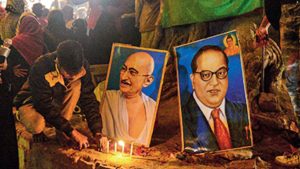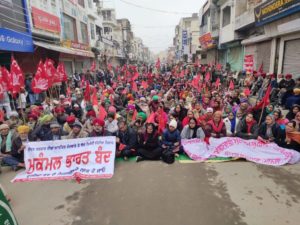Sangbida Lahiri
In this winter of discontent, in every procession, in every demonstration, in every protest—from JNU to Jamia or Aligarh to Jadavpur—the front rows are occupied by young women.
The independent nation has never seen such a sustained political agitation led by young women—vociferously, unfailingly and determinedly. Who are these protesting, shouting and uproarious young women? Are they just students from India’s liberal campuses? Or are they instigated by opponent parties? Is their participation an accident or is there a method in this upheaval?
It is neither an accident, nor an instigation. There is a clear and single-minded shift.
Female students in university campuses across India are out to show that the future of politics is shifting rapidly; that 21st century politics is not going to be handled by the rhetoric of masculinity anymore; that the time has come to deal in politics with care and concern for gender discourses rather than making that occasional call for for the blood of the rapist.
The increasing number of vocal girls is saying that gender-justice is not alms, but a systemic intervention into the nature and logic of politics itself.
This is the broad picture generally but there are more nuanced reasons why women are willing to bet themselves at the altar of restive, bloody street politics.
First, the Citizenship Amendment Act (CAA) threatens women in a larger way than men. Images and reports of detention camps in Assam have given demonstration to that effect. And women—not only from minorities, but across sections—have started to feel the fear of being disenfranchised.
This is a real fear, because suffrage is a key issue for a nation with a colonial past. In a nation like India, where the process of decolonisation is hardly over, the national identity of women emerged out of the construction of history of its struggles against the colonial (and also post-colonial) government. And hence, the threat to lose the right to vote or to get the citizenship nullified makes a deep impact.
It is a matter of survival for women in higher studies, who know what it has taken them to have finally found a voice. Therefore, they are are much more keen to resist the law, considering it as one that forecloses a fundamental aspect of gender justice.
Second, the fear of adequate documents. In India, women, across various socio-economic markers are often deprived of state papers.
Since 1990s, the government’s concern for prenatal and postnatal care in rural areas meant that many were birthed by midwives, complicating birth certification prospects; the rate of marriage registration is still arbitrary; women often do not possess immovable property under their name; and stay at the ‘care’ of father or husband after marriage.
Thus, the implementation of CAA and National Register of Citizenship (NRC) are introducing a new order, a new ‘definition of margin’ and a new hegemony, which is posing a grave threat to women across communities, caste and class.
Literacy is another reason in itself for increased participation of women. The substantive increase of female students in higher education means that girls are now travelling more, staying in hostels and participatory renting, making them independent and in control of their lives. This detachment from family and increased ownership of the self gives courage to speak up, to stand up and to raise voices; even against the state.
This ability is now further enhanced by harnessing of technology. A faster digital world is changing the way younger generations of women connect to the world, often adapting technology at a rate faster than men. Adoption of smart-phones and participation in social media-led collectivising is crucial in recognising an increased sense of liberty and a broader role in public voice and space.
So, under these circumstance, if she gets to know that a law like the CAA is about to disenfranchise her or her mother, or both; or if she knows that because of her birth lineage she is going to be sent in detention camps; or be denied rights of a citizen; or if she fears to lose her degrees and enfranchisement by random and mindless gate-keeping, what will she do?
She is doing what she should, marching bravely as vanguards in protests across the country.
(Sangbida Lahiri is a PhD Fellow in South and South East Asian Studies Department, University of Calcutta, Kolkata.)



